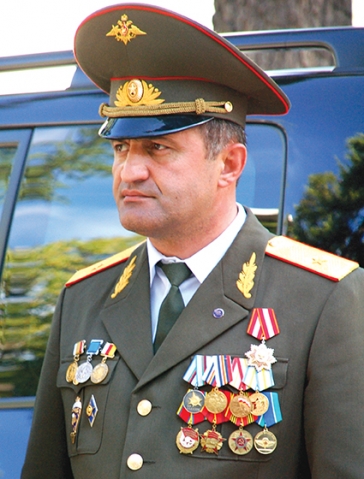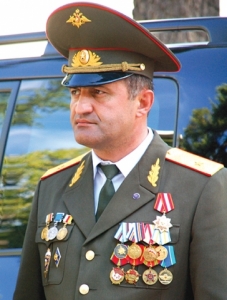On the New “President” of South Ossetia
The occupied Tskhinvali region has a new Head of State. The former military General Anatoliy Bibilov won the so-called presidential elections on Sunday. His primary rival, former FSB officer Leonid Tibilov, was second in the running, but fairly behind in terms of percentage.
According to the preliminary information, Bibilov got 57% (about 18,234 votes), Tibilov 30% (9,769 votes) and Gagloev 11% (3,581 votes). The population turnout was 81%. Tinilov, the active “president,” lost the elections and even his meeting with President Putin couldn’t help him this time. He is currently waiting for a new verdict from the Kremlin, and the occupied regime will announce the “official results” on April 14.
The Kremlin’s favorites in the occupied territories are obviously unlucky ones, as losing the so-called presidential elections has become something of a tradition there. In fact, Putin’s open support towards a candidate is even perceived as an ominous sign. This was the case twice in breakaway Abkhazia, for instance, when Raul Khajimba raised posters depicting him with Putin and in turn lost the elections. The same happened in occupied Tskhinvali, when in the so-called presidential elections of 2011, Anatoliy Bibilov took care to be photographed with the then-President of Russia Medvedev, but got disastrous results when the Kremlin cancelled the elections completely.
The former leader of Nikhasi, occupied Tskhinvali’s “Council,” 47-year-old Anatoliy Bibilov, has four children. He studied in the specialized General Leselidze boarding school and is professional military. Before that, he got an incomplete secondary education in Tskhinvali School N1. Bibilov took part and was wounded twice in the August 2008 War, after which he was granted the rank of Lieutenant-General.
Bibilov, unlike Tibilov, travelled to Akhalgori during the election campaign and even addressed the locals in Georgian. He tried to act in a diplomatic way and remain balanced, recalling the years of his youth when he studied in Tbilisi for three years. Bibilov promised the Georgians there that he would rearrange the untidy system of issuing permits for them to cross the so-called border.
Mamuka Areshidze, Head of the Caucasus Center for Strategic Studies, does not believe him and thinks that Bibilov will uncompromisingly pursue Russian policy. “The Georgian population living in Akhalgori will end up with more problems and an even more difficult situation than the separatist Abkhazian “President” Raul Khajimba has created for the Georgian population living in the Gali region,” Areshidze says.
Despite his Ossetian family name and origins, Bibilov is a Russian official. “We should not forget that he is military, therefore has very good relations with the military establishment in Moscow, the latter being no less powerful than the FSB. For instance, he is friends with Defense Minister Sergey Shoygu,” Areshidze says. However, the lion’s share in Bibilov’s victory is not due to his military ties but the request of the former so-called President Kokoity, who called on his supporters to vote for Bibilov. It is said the Kremlin had “forbidden” Kokoity from running in the so-called elections.
In his interviews with Russian publications during the election campaign, Bibilov referred to South Ossetia as part of Russia and to Georgia as a neighboring country. Bibilov also supports joining the Russian Federation. As, currently, Moscow does not need Tskhinvali, since the annexation of Crimea is still stuck in its throat, it is difficult to predict how realistic it is for the breakaway region to join Russia in the near future. Nevertheless, it is not excluded that they will agree to hold the so-called referendum, if Bibilov proposes to do so, and realize the results of the referendum later, when they feel like it.
Following the ethnic cleansing in the occupied Tskhinvali, there are just 32,736 “voters” “registered” in the region. An additional 7,464 “ballots” were sent to the “polling stations” opened in Russia and occupied Abkhazia. Notably, parallel to the “Presidential elections,” another “referendum” was held in Anklavi, where more than 78% “voters” supported adding the term “State of Alania” to its current name of South Ossetia.
Neither the Georgian side nor the international community recognize the elections or referendum in the de-facto republic of South Ossetia. Together with the Georgian officials, statements about the illegitimacy of these elections have been openly made by numerous international organizations and bodies.
Zaza Jgarkava












